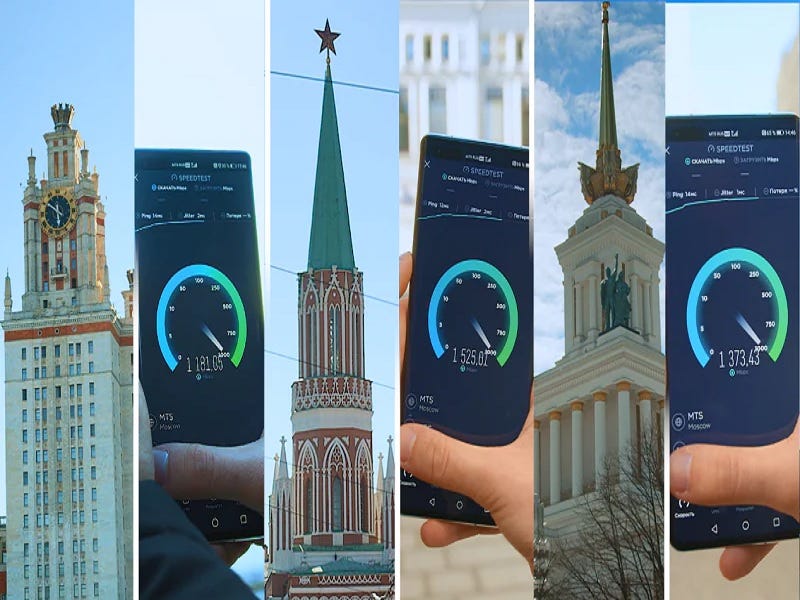Could New Indian 5G Technology Replace Russia’s Reportedly Stalled Chinese Partnership?
As it stands, Russia’s been forced into a very difficult position. Its 5G dreams were dashed after Chinese companies reportedly got cold feet, yet India can’t immediately replace them as partners of choice since it’s only just rolling out its own technology whose quality has yet to be ascertained as compared to its competitors.
No major economy can do without 5G technology in the coming future since it’s inextricably connected to the emerging Internet of Things (IoT) that’s expected to become commonplace in everyday life across the next decade. Up until the latest US-provoked phase of the Ukrainian Conflict, Russia clearly regarded Chinese companies as its preferred partners as evidenced by its largest mobile operator MTS launching this network in Moscow in April 2021 with Huawei, but that strategic relationship now appears to be in limbo.
China’s reported compliance with the US’ sanctions coupled with associated reports in Russian media about Huawei scaling back its domestic operations (including by not taking on new contracts) and relocating staff to Central Asia have raised doubts about the future of their 5G partnership. Furthermore, “Huawei and ZTE might face difficulty in providing network equipment to Russian telecom operators, as they are heavily reliant on TSMC, Intel and Samsung on semiconductors, and wouldn’t want to be falling foul of US sanctions”, according to a reputable Indian tech blog.
On the topic of India, it just so happens that Russian Deputy Minister of Digital Development, Communications, and Mass Media Bella Cherkesova met her Indian counterpart Devusinh Chauhan on the sidelines of a conference of the UN’s International Telecommunication Union (ITU) in Romania last weekend. Ahead of his country launching its indigenous 5G network next month, his ministry released a statement reporting that “She further showed keen interest in deepening the collaboration with India in the field of advanced telecom technology, security, and developing 5G use cases.”
While details remain scarce and it might very well be that nothing has yet to be agreed upon between these two historical partners, it certainly seems to be the case that Russia is now actively exploring replacements for its reportedly stalled Chinese 5G partnerships. India would naturally come to mind as the most likely country that could play this role since it’s bravely defied US pressure to condemn and sanction Russia. Nevertheless, it’s unclear to what extent its indigenous 5G technology is dependent on semiconductors from companies whose governments have sanctioned Russia.
That could pose a problem on par with the one that Russia’s presently experiencing with Huawei, but if India’s plans to become a chip powerhouse succeed, then a viable alternative to China could emerge for Moscow sometime later this decade. Even so, time is of the essence when dealing with emerging technologies since every lost month could set players further behind their competitors in this frantic zero-sum race. It’s therefore urgent for Russia to seriously explore the full range of opportunities and limitations inherent in strategically partnering with India on 5G.
On the one hand, India has proven its reliability to Russia, but on the other, the reliability of its indigenous 5G technology has yet to be proven in terms of quality and commitment in the face of the secondary sanctions threats from the US-led West’s Golden Billion. The argument can thus be made that it’s premature for Russia to replace its stalled Chinese partnership with an Indian one for that reason, but at the same time, an equally compelling argument is that there’s no harm in exploring the possibility of India as an equal partner in order to diversify from its dependence on Beijing.
As it stands, Russia’s been forced into a very difficult position. Its 5G dreams were dashed after Chinese companies reportedly got cold feet, yet India can’t immediately replace them as partners of choice since it’s only just rolling out its own technology whose quality has yet to be ascertained as compared to its competitors. Moreover, it’s unclear whether – and if so, when – India can scale up its related production to have the excess capacity required to forge international strategic partnerships without this occurring at the expense of its massive domestic needs.
In any case, there’s no question that Russia’s previous dependence on China was partially responsible for this predicament. Moscow never imagined that its partner’s companies would comply with Washington’s unilateral sanctions, yet the relationship of complex economic interdependence that’s been created over the decades between China and the Golden Billion means that the latter can pressure the former as reports regrettably seem to prove, which naturally reduces Beijing’s reliability.
Looking forward, Russia will continue struggling to revive its 5G plans, but it seems to have learned the hard lesson not to place all its eggs in China’s basket. The implications of this are far-reaching and suggest that the Kremlin will continue to remain conscious of the strategic risks associated with dependence on China in any sphere. In response, Russia is expected to increasingly rely on India to preemptively avert such dependence or reduce it wherever this already exists like with 5G.



India should be Russia's preferred partner. China is just in it for money/power/interest, their heart is not in the game.